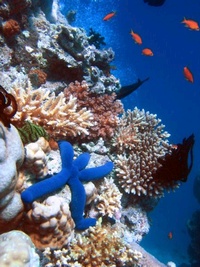
Coral reefs are aragonite structures produced by living organisms, found in shallow, tropical marine waters with little to no nutrients in the water. High nutrient levels such as that found in runoff from agricultural areas can harm the reef by encouraging the growth of algae. In most reefs, the predominant organisms are stony corals, colonial cnidarians that secrete an exoskeleton of calcium carbonate (limestone). The accumulation of skeletal material, broken and piled up by wave action and bioeroders, produces a massive calcareous formation that supports the living corals and a great variety of other animal and plant life. Although corals are found both in temperate and tropical waters, reefs are formed only in a zone extending at most from 30°N to 30°S of the equator; the reef-forming corals do not grow at depths of over 30 m (100 ft) or where the water temperature falls below 16 °C (72 °F).